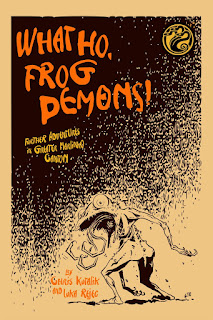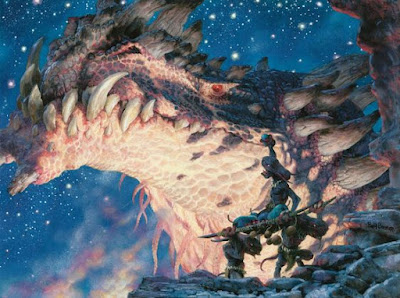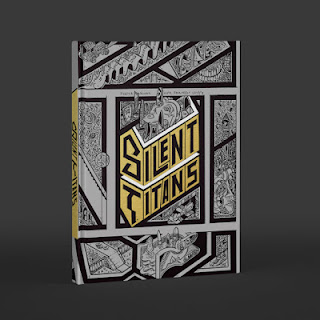A Case For Having No Setting
First off, established settings are often quite fine and, if executed properly, result in interesting and fun play. I am not making a case against anyone ever using an established setting or coming up with a neat original setting. I have dabbled in this myself.
Here is my recipe for starting a game without a setting.
Start with an adventure. You can make this yourself or use someone else's. It really doesn't matter.
Adventures always have implied settings that create possibilities for adventure in the world beyond the module itself.
During your first session, listen for characters asserting things about their background. Take note of them. Especially jokes. Jokes that turn into cool campaign stuff can be awesome, but be careful to avoid forcing the joke.
After your first session, brainstorm all the possibilities that this first adventure has set up for the rest of your campaign world.
Mix these with the background details your players came up with during play or character creation.
Use your mixture to create adventure locations, nations, cities, monsters, factions, ect.
Taste. (Mm taste that flavor. Pure vanilla. Excessive lip smacking.)
Add more adventures by yourself or someone else. Have more sessions.
Repeat the process. Excessive lip smacking is required or none of it will work. NONE OF IT!
Now you might be asking: "Hey, blog man, why do this instead of make own setting?"
I'm glad you asked, Jimmy! But, man, you really got to work on your grammar!
First off, it is soooooo much less work and creative effort. Have you ever noticed how easy it is to come up with new stuff based off old stuff rather than come up with brand new stuff straight out ya butt?
Secondly, there is something to be said for applying emergent narrative to your entire world. Chris Kutalik did it and has written his Hill Canton books about the setting which came into being as he winged it and reacted to his players. His most recent post is a great example of this, regarding his new book: What Ho Frog Demons!
(I love Chris Kutalik's stuff to death. Yo, Chris, if you are reading this, thank you so much for being one of the blogs that first got me started on this crazy OSR train and for being one of the first people to put my blog in their recommended. Dude, that meant so much to me, you have no idea. If you ever want to work on something together, I would be sooo down.)
I even used one of Chris' Misty Isles of the Eld adventure locations as a start for one such campaign that I already built off details from another of my campaign worlds that also started out the same way that turned into crazy Raddish worshipping farmers ordering around Eld servants by covering themselves in Eld blood as a disguise. So that's like "no setting" inception on the limbo level.
The settings which emerge from this process can be downright wonderful and often have the effect of tying the players ever deeper to the setting as they realize they had a hand in the world's creation. It is subtler than just asking them to build the setting for you like with a Session 0 and thus also allows for an element of exploration. They don't know where you will hide the goodies that come as a consequence of their idle banter or even remember what banter you held onto until it resurfaces.
Thirdly, these worlds are functional and adaptable. Since a lot of published adventures try not to shove their settings down your throat, your setting will naturally have few restrictive clauses or rules, allowing you to increasingly add on new things and modules.
What are the downsides?
Well, not all settings that come from this are really worth writing books or blogging about. I used to try and write about my Graylands setting that came about in this way but I don't really think it was that worth it. Who knows, my following was nothing compared to now, maybe people would think differently if I brought it our now. But really there was nothing especially notable about it. It was kind of weird Warhammer fantasy-esque with some supernatural and cosmological details based off of what I liked about (once again) Hill Cantons and some stuff from the tv version of Jonathan Strange and Mr. Norrell. Feel free to read about it here, here, here, and here though I cannot vouch for old me's quality and I did do more posts about it than that but as I was trying to find them all for links, I decided that would be too many so if you are really interested in hunting down my old work you're are going to have to use that archive tool.
So the problem, really, is that you are dealing with uncontained ideas and concepts and these tend to lose their form and individuality, becoming more generic. That doesn't always have to happen, for sure, but it can. The same thing can be said of an "original" setting though so there.
Also, players can sometimes perceive the patchwork nature of the world and find it less compelling. I don't find it less compelling so long as I get my rpg fix, but I can see someone who expected an original setting being let down if they catch on to what you are doing.
So anyway, this is probably common practice for a lot of you, but I hope this will help those of you that have felt like you needed a complete setting feel a little more at ease with winging it.
Here is my recipe for starting a game without a setting.
Start with an adventure. You can make this yourself or use someone else's. It really doesn't matter.
Adventures always have implied settings that create possibilities for adventure in the world beyond the module itself.
During your first session, listen for characters asserting things about their background. Take note of them. Especially jokes. Jokes that turn into cool campaign stuff can be awesome, but be careful to avoid forcing the joke.
After your first session, brainstorm all the possibilities that this first adventure has set up for the rest of your campaign world.
Mix these with the background details your players came up with during play or character creation.
Use your mixture to create adventure locations, nations, cities, monsters, factions, ect.
Taste. (Mm taste that flavor. Pure vanilla. Excessive lip smacking.)
Add more adventures by yourself or someone else. Have more sessions.
Repeat the process. Excessive lip smacking is required or none of it will work. NONE OF IT!
Now you might be asking: "Hey, blog man, why do this instead of make own setting?"
I'm glad you asked, Jimmy! But, man, you really got to work on your grammar!
First off, it is soooooo much less work and creative effort. Have you ever noticed how easy it is to come up with new stuff based off old stuff rather than come up with brand new stuff straight out ya butt?
Secondly, there is something to be said for applying emergent narrative to your entire world. Chris Kutalik did it and has written his Hill Canton books about the setting which came into being as he winged it and reacted to his players. His most recent post is a great example of this, regarding his new book: What Ho Frog Demons!
Luka, as always, rocks the cover art (Correct me if that wasn't him, but anyway Luka is great.)
(I love Chris Kutalik's stuff to death. Yo, Chris, if you are reading this, thank you so much for being one of the blogs that first got me started on this crazy OSR train and for being one of the first people to put my blog in their recommended. Dude, that meant so much to me, you have no idea. If you ever want to work on something together, I would be sooo down.)
I even used one of Chris' Misty Isles of the Eld adventure locations as a start for one such campaign that I already built off details from another of my campaign worlds that also started out the same way that turned into crazy Raddish worshipping farmers ordering around Eld servants by covering themselves in Eld blood as a disguise. So that's like "no setting" inception on the limbo level.
The settings which emerge from this process can be downright wonderful and often have the effect of tying the players ever deeper to the setting as they realize they had a hand in the world's creation. It is subtler than just asking them to build the setting for you like with a Session 0 and thus also allows for an element of exploration. They don't know where you will hide the goodies that come as a consequence of their idle banter or even remember what banter you held onto until it resurfaces.
Thirdly, these worlds are functional and adaptable. Since a lot of published adventures try not to shove their settings down your throat, your setting will naturally have few restrictive clauses or rules, allowing you to increasingly add on new things and modules.
What are the downsides?
Well, not all settings that come from this are really worth writing books or blogging about. I used to try and write about my Graylands setting that came about in this way but I don't really think it was that worth it. Who knows, my following was nothing compared to now, maybe people would think differently if I brought it our now. But really there was nothing especially notable about it. It was kind of weird Warhammer fantasy-esque with some supernatural and cosmological details based off of what I liked about (once again) Hill Cantons and some stuff from the tv version of Jonathan Strange and Mr. Norrell. Feel free to read about it here, here, here, and here though I cannot vouch for old me's quality and I did do more posts about it than that but as I was trying to find them all for links, I decided that would be too many so if you are really interested in hunting down my old work you're are going to have to use that archive tool.
So the problem, really, is that you are dealing with uncontained ideas and concepts and these tend to lose their form and individuality, becoming more generic. That doesn't always have to happen, for sure, but it can. The same thing can be said of an "original" setting though so there.
Also, players can sometimes perceive the patchwork nature of the world and find it less compelling. I don't find it less compelling so long as I get my rpg fix, but I can see someone who expected an original setting being let down if they catch on to what you are doing.
So anyway, this is probably common practice for a lot of you, but I hope this will help those of you that have felt like you needed a complete setting feel a little more at ease with winging it.



I designed the cover, but that is Luka's frog illustration on it, and he is great.
ReplyDeleteThank you!
Delete